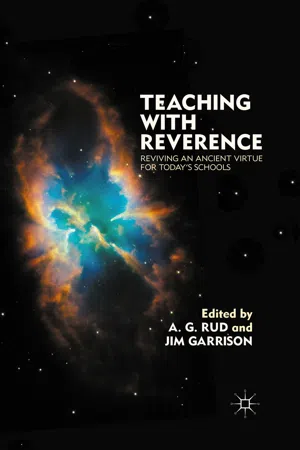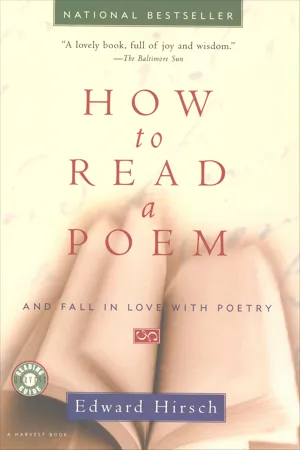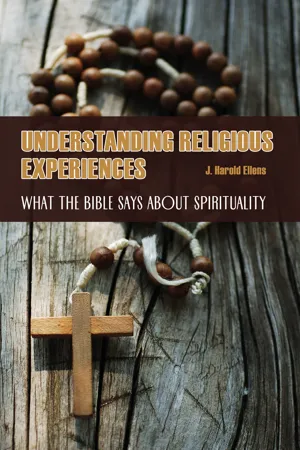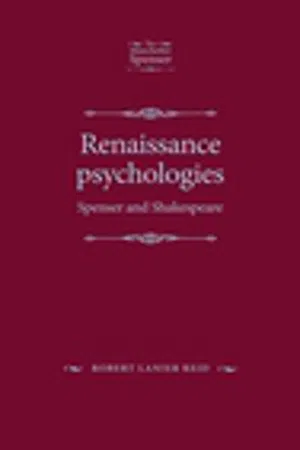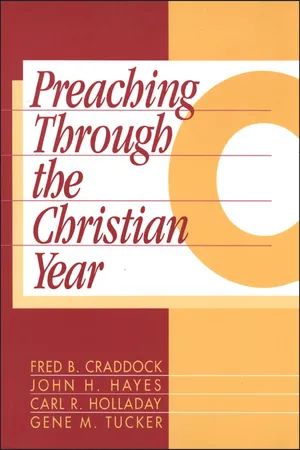Literature
Epiphany
An epiphany in literature refers to a moment of sudden insight or realization experienced by a character. It often leads to a significant change in the character's understanding or perspective. Epiphanies can be pivotal in driving the plot forward and are commonly used to reveal deeper truths about the characters or the story's themes.
Written by Perlego with AI-assistance
Related key terms
1 of 5
7 Key excerpts on "Epiphany"
- eBook - PDF
Teaching with Reverence
Reviving an Ancient Virtue for Today's Schools
- A. Rud, J. Garrison(Authors)
- 2012(Publication Date)
- Palgrave Macmillan(Publisher)
The essence of Epiphany is that one apprehends a deep and significant meaning from an ordinary action or humble observation. The original idea of Epiphany derives from revelatory experiences undergone when one comes to know God. In Christianity, the Feast of the Epiphany celebrates the revelation of God as a human being in the form of Jesus Christ. Across a wide array of religions, the idea of Epiphany describes a character of a faith experience when an individual interprets an event as caused by divine intervention. The Romantic tradition of art and writing elevated the idea of the Epiphany as a mode of significant experience that provided understand- ing and access to vivid experiences that illuminate singular insights into self or the world. Moments can be had that unleash meaning and signifi- cance beyond their propositional value. They’re often sudden moments of en-lighten-ment, as in entering into the light. The language of the poets embodies this quality of enlightenment. The Moment “gleams like the flashing of a shield,” and, as Goethe calls it, a “flash of now.” Samuel Taylor Coleridge saw within the world “flashes”; Lord Alfred Tennyson com- posed much of his poetry about “little things. . . . that strike on a sharper sense.” Wordsworth, in particular, made use of the epiphanic mode to knit together longer narratives by choosing subjects from “ordinary life” that, as Langbaum describe, excite “a feeling analogous to the supernatu- ral by lifting the film of familiarity from our eyes” (1983, 271). Morris Beja whose analytic work on the modern psychological novel and, in particular, the Irish writer James Joyce whose fiction relied on Epiphany as a central element, defines the Epiphany as a “sudden spiri- tual manifestation, whether from some object, scene, event or memorable phase of the mind—the manifestation of being out of proportion to the significance or strictly logical relevance of whatever produces it” (1971, - eBook - ePub
How To Read A Poem
And Fall in Love with Poetry
- Edward Hirsch(Author)
- 1999(Publication Date)
- Ecco(Publisher)
Thus she turns from the intense brightness and heat of what she has experienced to the slush and cold of the external world. She has been “out of it” and now is “back in it”; that is, back in the wintry world where the war is still going on, where it gets dark early, and where the date has not changed. In one sense, nothing has changed, but in another sense, for her, everything has changed. She has both lost and reconstituted herself. She returns to the outer dark where it is still February 5 with a painful self-awareness and knowledge of human identity, with a sense of the mysterious strangeness of life itself, with what W. B. Yeats calls “a new knowledge of reality.”The epiphanic moment always marks a crisis point in a work, a threshold experience. One notices how often, and how primitively, it is set off by the word suddenly. It is a moment of illumination that signals a dramatic turning point for the protagonist. The change is interiorized; under the pressure of insight one’s mental landscape is irrevocably altered. Such moments are “visionary”; that is, they mark a crossover from one level of experience to another. There is a twofold risk or danger in trying to incorporate or contain the transcendental experience in writing. Since the Epiphany is by definition triggered by an ordinary experience, one danger is that the writer will communicate the ordinariness and not the Epiphany, thus getting stuck in concrete particulars, in an untransformed matter-of-factness. The other risk is that the ordinary experience will trigger what seems an inordinate or melodramatic response, what Keats calls “the egotistical manufacture of metaphysical importance upon trivial themes.”Epiphanic experiences exist outside ordinary time. They are atemporal. The consequences of such visionary experiences for time-bound narratives are profound. Most poems, for example, have both narrative and lyrical values: the impulse to tell a story, the impulse to sing. These impulses are not necessarily in harmony with each other. The point of narrative is to strengthen the bonds of consequence, the course of narrative is movement. Momentum is life itself since its goal is always to continue, to carry on, to create an unceasing flow of events. It is all motion and accretion. That is why E. M. Forster called narrative “the lowest and simplest of literary organisms.” The goal of the lyric, on the other hand, is often to dramatize intense states of feeling. “When Wordsworth decided in the “Preface” to the Lyrical Ballads “to let the feeling give importance to the action and situation, and not the action and situation to the feeling,” he was in effect reversing the Aristotelian prescription for the primacy of action. He was lyricizing narrative (hence the title, Lyrical Ballads - eBook - PDF
Understanding Religious Experiences
What the Bible Says about Spirituality
- J. Harold Ellens(Author)
- 2007(Publication Date)
- Praeger(Publisher)
69 CHAPTER 7 B IBLICAL S PIRITUALITY AS S EEING G OD : E PIPHANY An Epiphany is a moment when we realize a new and important thing rather suddenly, as though someone turned on a light in our minds or spirits. My father always liked to mention the conundrum of the man who stayed up all night to be sure to see how the sun rose, and finally it dawned on him. Ok, so you do not like dumb puns. My father liked them for their wry, subtle, and understated humorfulness. However, my point is that an Epiphany is a moment when something important, particularly an important meaning of some kind, dawns on you. The ancient Greeks had a festival called Epiphany, which celebrated the appearance of a god to a human, at some specified place. Epiphany is a date in the liturgical calendar of both the Eastern (Orthodox) and Western (Roman Catholic) churches, and it is celebrated on January 6 each year. It commemorates the appearance of the star to the Wise Men who, according to the nativity story in Matthew’s gospel, came from Iraq to see Jesus, the Christ child (Mt 2:1–12). When Jesus was born in Bethlehem of Judea, in the days of Herod the king, behold, wise men from the East came to Jerusalem, saying, “Where is he who has been born king of the Jews? For we have seen his star in the East, and have come to worship him.” When Herod the king heard this, he was troubled, and all Jerusalem with him; and assembling all the chief priests and scribes of the people, he inquired of them where the Christ was to be born. They told him, “In Bethlehem of Judea; for so it is written by the prophet: - eBook - ePub
Wonder Strikes
Approaching Aesthetics and Literature with William Desmond
- Steven E. Knepper(Author)
- 2022(Publication Date)
- SUNY Press(Publisher)
It may be deep or superficial. Aristotle’s recognition is capacious and not necessarily revelatory in the profound sense. His emphasis is more on plot than character. Still, it hints at epiphanic possibilities. The term Epiphany arrives much later in the history of literary criticism. James Joyce makes important use of it in the early twentieth century. 35 It shows up in Stephen Dedalus’s aesthetic musings. In Stephen Hero, young Stephen describes moments of epiphanic disclosure in which “the soul of the commonest object, the structure of which is so adjusted, seems to us radiant. The object achieves its Epiphany.” 36 The focus here is on revelatory encounters with things, but such encounters can also take place between people. The term’s religious origins point to this possibility. 37 We can turn once more to an ancient text. The Feast of the Epiphany celebrates the arrival of the Magi in Bethlehem (Matthew 2:1–12). They have used their knowledge of the stars to reach this town, and they gain new, determinate knowledge there. This is the baby for which they have searched. This recognition opens the deepest mystery, though. What does it mean for this flesh-and-blood baby to be the new king, to be the Messiah? The determinate knowledge intimates something ungraspable. The wisdom of the Magi is not only their uncovering of this determinate knowledge but their recognition of what exceeds their determinations, a recognition conveyed in their worship of the child and their offering of gifts. Furthermore, this recognition will change them and their sense of the world in profound ways—perhaps in ambiguous and difficult ways, as T. S - eBook - ePub
Renaissance psychologies
Spenser and Shakespeare
- Robert Lanier Reid, J. B. Lethbridge(Authors)
- 2017(Publication Date)
- Manchester University Press(Publisher)
Does Shakespeare ‘secularize’ Epiphany, recasting the soul’s quest for joyous vision in his own culture’s ideologies and fictive paradigms? Comparison with the visionary aesthetics of nineteenth- and twentieth-century artists offers some perspective on this unsolvable question. James Joyce’s Stephen Hero, turning from the priesthood to write poetic fictions, explains his new vocation as an openness to moments of ‘Epiphany’, both in life and language:By Epiphany he meant a sudden spiritual manifestation, whether in the vulgarity of speech or of gesture or in a memorable phrase of the mind itself. He believed that it was for the man of letters to record these epiphanies with extreme care, seeing that they themselves are the most delicate and evanescent of moments.52Whereas the epiphanies of Shakespeare’s late plays increasingly serve both artistry and religious faith, Morris Beja in Epiphany in the Modern Novel stresses that for modern poets such as the Imagists and novelists such as Joyce, Proust, Faulkner, and Woolf, this ‘spiritual manifestation’ is basically secular.53 For Joyce it is not a ‘manifestation of godhead, the showing forth of Christ to the Magi, although that is a useful metaphor’, but rather ‘the sudden “revelation of the whatness of a thing”, the moment in which “the soul of the commonest object … seems to us radiant”’.54 Richard Ellmann notes Joyce’s brash secularization of the mystery’s source and meaning: some epiphanies, says Stephen, are ‘eucharistic’, moments of fullness and passion; but ‘I must wait for the Eucharist to come to me’ and then ‘set about translating the phrase into common sense,’55 – into everyday pragmatism and demystified materialism.What then is secularization: substantial, or only nominal change? If Dante, Shakespeare, and Joyce offer distinct modes of Epiphany, does this difference alter the complexities of being (world, embodied soul, God) to which each poet refers? Does it distinguish their inner conditions, or the meaning and impact of their fictions? Does the reality of God, Christ, and Spirit, and the devotional or philosophic quests to know this spiritual reality, steadily lose bearing on literary works? The question of Epiphany is surely as complex for Joyce as for Shakespeare, each reared in a divided and embattled Christian culture, each a sophisticated master of metaphoric evasiveness, indirectness, irony, reversibility. Let us evaluate some apparent differences between Shakespeare’s epiphanies (especially in the romances) and those of Joyce and other moderns. First, Shakespearean Epiphany, evoked by momentous relational crisis, discloses the value and miraculousness of human life: the comic Epiphany of love, keying on magical twinship of souls; the Epiphany of power in the histories, and guilt in the tragedies – mesmerizing acts of domination (Titus, Aaron, Richard III, Cornwall, Coriolanus) or the true empowerment of loving sacrifice (Talbot, Henry V, Orlando, Viola, Helena, Cordelia);56 - eBook - ePub
The Space Between
Literary Epiphany in the Work of Annie Dillard
- Sandra Humble Johnson(Author)
- 2011(Publication Date)
- The Kent State University Press(Publisher)
Dillard speaks of her predilection a second time in the introduction: “The truth about China I leave to the experts. I intend only to tell some small stories, and to depict precise moments precisely, in the hope that a collection of such moments might give an impression of many sharp points going in different directions—might give a vivid sense of complexity” (4). Dillard’s description of “many sharp points” clearly defines one aspect of literary Epiphany, as the grouping of unrelated objects, places, and emotions is a key element in epiphanic development. Dillard further suggests the nature of Epiphany when she disclaims she is writing “truth”; simply recording “precise moments” allows readers their own truth-finding, or illuminating, experience. When the writer’s role is simply that of conveyor of diverse information faithfully recorded, readers are forced into making their own “deep” connections; this is the essence of the process of Epiphany.Dillard’s last comment in the introduction of Encounters concerning her use of “moments” is not only significant for Encounters but also becomes a definitive statement about the use of illumination in the Dillard canon:These are only glimpses, not portraits; their subject is not China, and not even entirely Chinese writers, but a few vivid, equivocal moments in the days of some of earth’s people in the twentieth century. What interests me here, and elsewhere, is the possibility for a purified nonfiction narration— a kind of Chekhovian storytelling which might illuminate the actual world with a delicate light— coupled with humor in the American tradition and no comment. (7) - eBook - PDF
Preaching Through the Christian Year: Year C
A Comprehensive Commentary on the Lectionary
- Fred B. Craddock, John H. Hayes, Carl R. Holladay, Gene M. Tucker(Authors)
- 1994(Publication Date)
- Trinity Press International(Publisher)
Second, Christ is to be seen as the turning point in the divine drama, the moment of reve-lation when God's eternal purpose became fully known. Underlying our passage is a twofold scheme: something previously hidden has now been revealed (cf. v. 5). There is the recognition that a dramatic shift has occurred in the history of salvation and that Christ is the hinge ,on which history has turned. It is in this regard that our text surfaces some of the central themes of Epiphany, for this is the time when we recognize that darkness gives way to light, hiddenness to openness, mystery to revelation, ignorance to knowledge. Our text affirms that the mystery of Christ in former generations . . . was not made known to humankind: (v. 5), and this re-minds us that the coming of Christ was a watershed in the divine economy. We stand this side of the apostles and prophets to whom the Spirit revealed this mystery, and now it is possible for everyone to see what was invisible to previous generations (v. 9). Third, the scope of God's manifestation through Christ as depicted in our passage is cosmic. We have already noted that it is universal, including both Jews and Gentiles. But more than that, today's text affirms that God's mystery has now been unveiled to the rulers and authorities in the heavenly places (v. 10; cf. 1:21; 2:2; 6:12; also Rom. 8:38; 1 Cor. 15:24; Col. 1:13, 16; 2:10, 15; Pet. 3:22; Heb. 2:5). The light that has shone through Christ has shone not only on earth but has lit up the heavens as well. If the Gospel reading for today focuses on God's manifestation on earth, the epistolary reading extends this revelation into the heavens. This text already points us in the direction of mission, for Epiphany often begins a period when the church reflects on its mission, not only in the sense of proclaiming the gospel to the nations but also in the sense of working for peace and justice within the social order.
Index pages curate the most relevant extracts from our library of academic textbooks. They’ve been created using an in-house natural language model (NLM), each adding context and meaning to key research topics.
